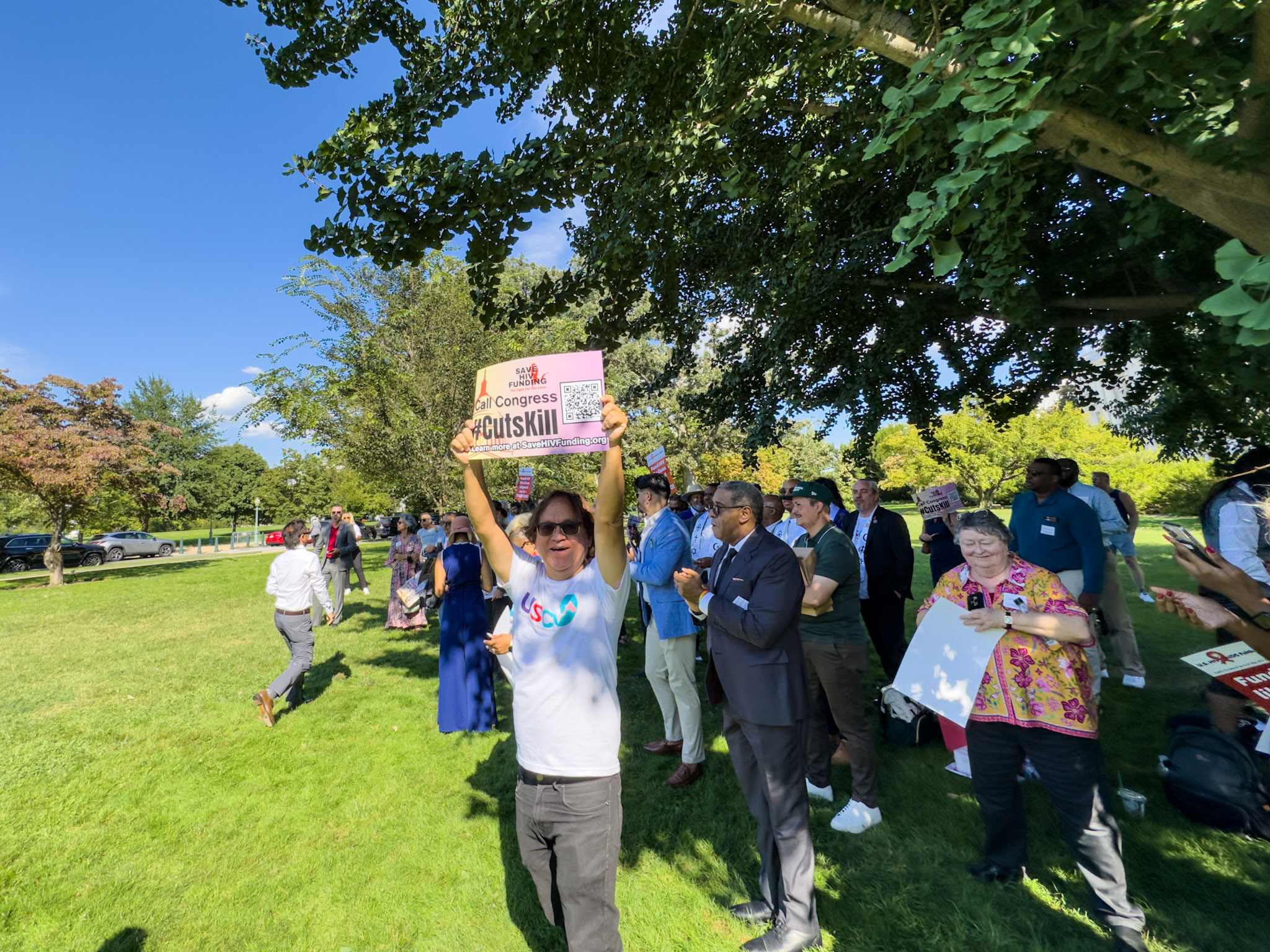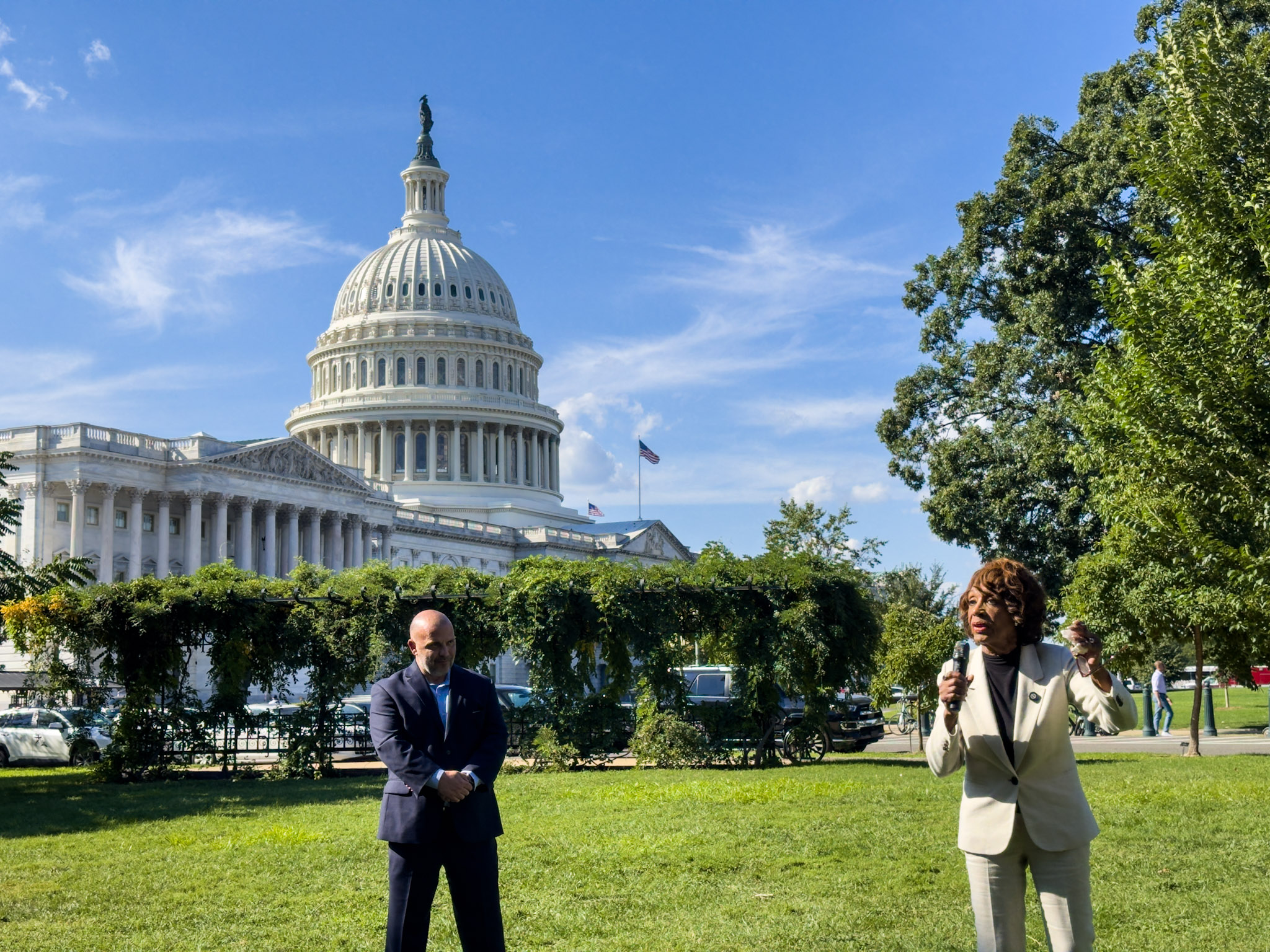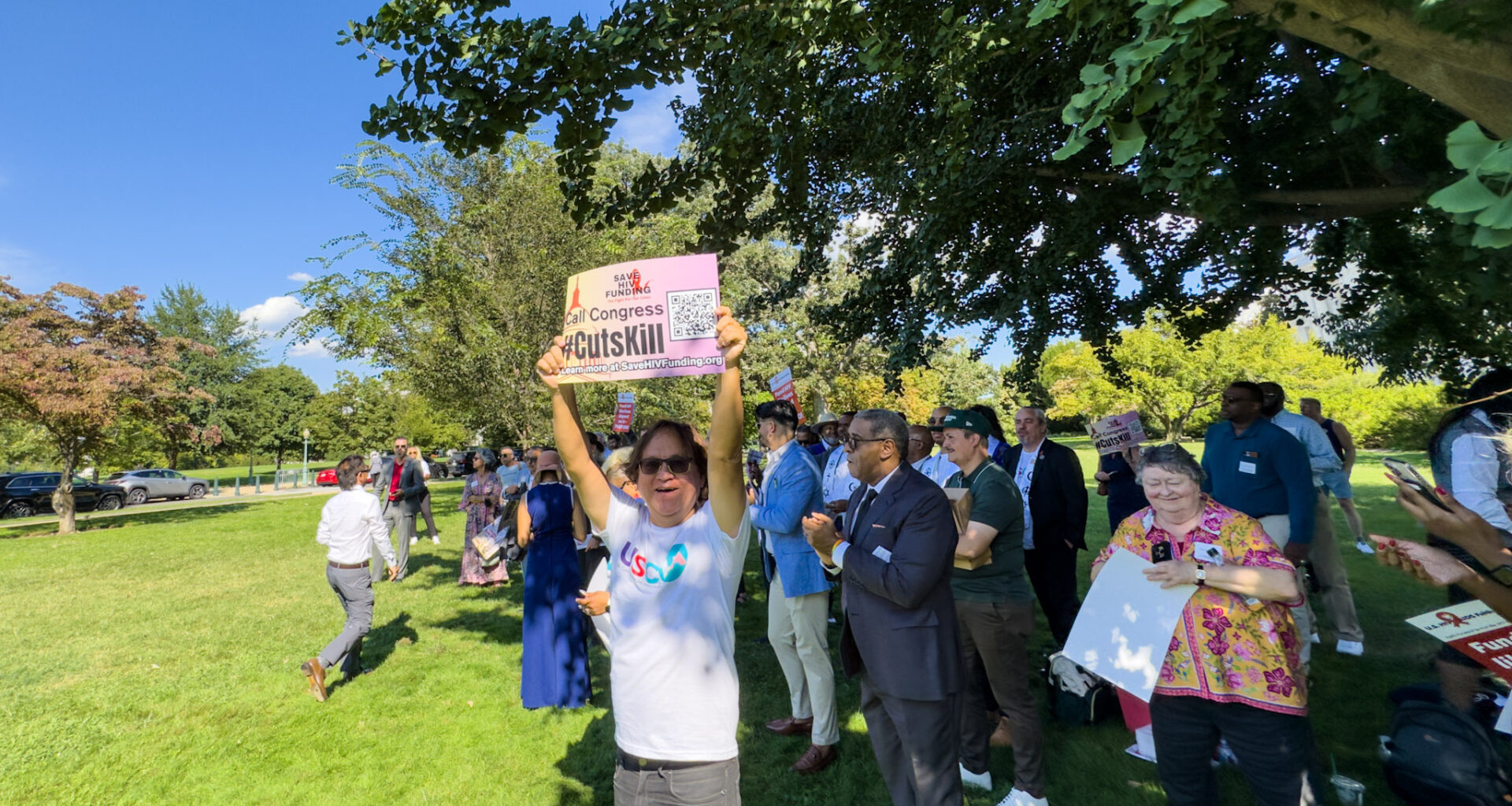Indianz.Com > News > ‘Fight like hell’: Federal funding cuts threaten HIV/AIDS programs
 Holding a sign reading “#CutsKill,” Todd Theringer, a citizen of the Leech Lake Band of Ojibwe who serves as a delegate to the UNAIDS Programme Coordinating Board, rallies in support of funding for HIV/AIDS programs at the U.S. Capitol on September 3, 2025. Photo by Indianz.Com (CC BY-NC-SA 4.0)
Holding a sign reading “#CutsKill,” Todd Theringer, a citizen of the Leech Lake Band of Ojibwe who serves as a delegate to the UNAIDS Programme Coordinating Board, rallies in support of funding for HIV/AIDS programs at the U.S. Capitol on September 3, 2025. Photo by Indianz.Com (CC BY-NC-SA 4.0)
‘Fight like hell’: Federal funding cuts threaten HIV/AIDS programs
Monday, September 8, 2025
By Acee Agoyo
Indianz.Com
WASHINGTON, D.C. —
Advocates for Americans with HIV and their allies in Congress are vowing to “fight like hell” in the face of funding cuts that they say will cost lives.
Legislation pending in the 119th Congress cuts $2 billion from HIV prevention and treatment programs. Everything from life-saving medication to housing assistance for the most vulnerable is on the chopping block as Republicans and President Donald Trump look for ways to reduce and outright eliminate federal spending.
“It is all threatened,” Rep. Maxine Waters (D-California) said at a rally at the U.S. Capitol last Wednesday.
“It is all threatened in ways that we never envisioned,” added Waters, who has been advocating for HIV/AIDS programs for more three decades as one of the longest-serving Democratic members of the U.S. House of Representatives.
 Rep. Maxine Waters (D-California), right, speaks in support of funding for HIV/AIDS programs during a rally at the U.S. Capitol on September 3, 2025. Photo by Indianz.Com (CC BY-NC-SA 4.0)
Rep. Maxine Waters (D-California), right, speaks in support of funding for HIV/AIDS programs during a rally at the U.S. Capitol on September 3, 2025. Photo by Indianz.Com (CC BY-NC-SA 4.0)
Waters spoke ahead of the U.S. Conference on HIV/AIDS that took place in the nation’s capital. Amid a heavy presence of law enforcement and military personnel ordered to Washington, D.C., by Trump, thousands of advocates met at a critical time.
”Let’s not feel like we are so intimidated by what is going on with the president,” Waters observed.
“Let’s not be intimidated. Let’s say it’s time to fight like hell,” Waters continued.
Just a day before Waters spoke at the rally, Republicans in the House advanced a fiscal year 2026 appropriations bill that eliminates $2 billion in federal funding for HIV and AIDS programs. A companion bill in the U.S. Senate, however, does not contain the same cuts.
“These cuts threaten to take us back to those times — back to that grief and that suffering and that violent neglect, which needlessly took thousands of lives,”
actor Javier Muñoz said at the U.S. Capitol.
“Cuts to HIV funding kill. Period,” added Muñoz, who has been living with HIV for more than two decades, during which he became well known for his Broadway performances in Hamilton and In the Heights.
Note: Tlingit elder Bill Hall is seen in Slide One and Slide Seven in a September 7, 2025, social media post from the National Minority AIDS Council.
Bill Hall, who is Tlingit from the Native village of Hoonah in Alaska, has been living with the human immunodeficiency virus since 1986. He was one of the keynote speakers at the U.S. Conference on HIV/AIDS, which ran from Thursday through Sunday in D.C.
Speaking at the Marriott Marquis hotel on Sunday, Hall recounted the ways in which HIV treatment has changed. When he was diagnosed nearly four decades ago, he said he was left alone in a room and was given no information about a disease by doctors or medical professionals at a hospital in Washington state.
“We were watching how the world was responding to the ‘gay disease,’” Hall said in recalling how HIV and AIDS patients felt stigmatized by the public. “We were very fearful.”
But even as he was revered at the conference, whose theme was “Aging with HIV,” Hall said the disease continues to exact a toll on older Americans.
“So many of the long-term survivors today are exhausted,” Hall said. “Sadly, a lot of people my age isolate — and that’s very sad.”
“They isolate. They don’t go out,” Hall continued. “It’s a very lonely disease.”
A powerhouse panel of community, medical, and workforce voices at the 2025 USCHA Closing Plenary that have made it possible for us to be loving, living, and aging with HIV. #WeAreAllHereTogether
Posted by NMAC on Sunday, September 7, 2025
The experiences of Hall and other survivors are playing a central role as advocates seek to prevent Congress from cutting funds for HIV and AIDS programs.
Rachel Levine, who served as the Assistant Secretary for Health at the Department of Health and Human Services during the Joe Biden administration, appeared alongside Hall as a keynote speaker on Sunday.
“It really is getting those medical miracles to people to who need it the most,” said Levine, who specifically cited American Indians and Alaska Natives as among those who benefit from federal funding for HIV/AIDS programs.
President Donald Trump, however, is changing course when it comes to programs tailored to minority groups — whether it’s race, ethnicity or gender identity. Earlier in the year, the National Congress of American Indians (NCAI) hosted a historic panel where Two Spirit leaders and advocates discussed how changes in health care and policy are affecting some of the most vulnerable.
“The new administration has taken target on LGBTQIA people, their protections and the programming that serves their community,” Tyson Johnston, a leader from the Quinault Nation in Washington state, said at NCAI’s executive council winter session in D.C. in February.
“Our Two Spirit relatives — especially the youth — are feeling these impacts,” said Johnston, who serves on his tribal council.
Indianz.Com Audio: Two Spirit Panel at National Congress of American Indians #ECWS2025
The fiscal year 2026 appropriations bill that cuts $2 billion from HIV/AIDS programs — including more than $1 billion at the Centers for Disease Control and Prevention (CDC) — from was unveiled last Monday, only a day before the House of Representatives returned to D.C. following a long break in August.
The measure was quickly approved at a subcommittee markup on the following day.
“The bill provides appropriate and fiscally responsible funding to ensure these departments can continue to perform their core missions while also safeguarding American taxpayer dollars,” said Rep. Tom Cole (R-Oklahoma), a citizen of the Chickasaw Nation who is the first Native person to serve as chair of the House Committee on Appropriations.
Cole has repeatedly spoken in support of the Trump administration’s efforts to cut funding for federal programs. His committee is set to approve the measure at a markup on Tuesday over Democratic objections.
“Once again, the majority’s bill would harm women’s health, children’s health, and public health, surrendering the safety and wellbeing of the American people to multiple health crises,” Rep. Rosa DeLauro (D-Connecticut), the highest-ranking Democrat on Cole’s committee, said at the markup last week.
“It completely eliminates funding for HIV/AIDS prevention at CDC, a cut of more than $1 billion, and cuts HIV/AIDS treatment under the bipartisan Ryan White program by more than $500 million,” said DeLauro.
As Congress has returned to work, Cole has acknowledged a deadline he is facing to keep the federal government up and running. Lawmakers have until September 30 to pass a slew of appropriations bills for fiscal year 2026, which begins on October 1.
Failure to pass the appropriations bills opens the door for a shutdown of the federal government, the last of which occurred during the first Trump administration. Tribal leaders have repeatedly said that government shutdowns represent a violation of the trust and treaty obligations owed to their people.
“Delays in federal health funding or reductions in support directly threaten the lives of our people and jeopardize access to hospitals, clinics, mental health resources and public health programs,” said NCAI President Mark Macarro during the State of Indian Nations earlier this year.

